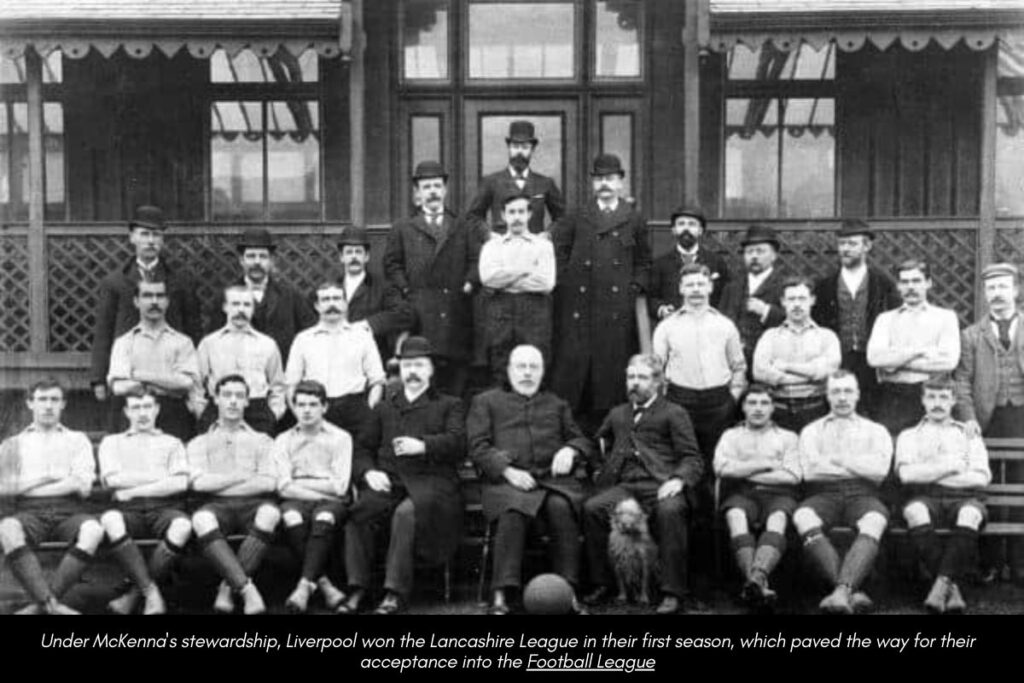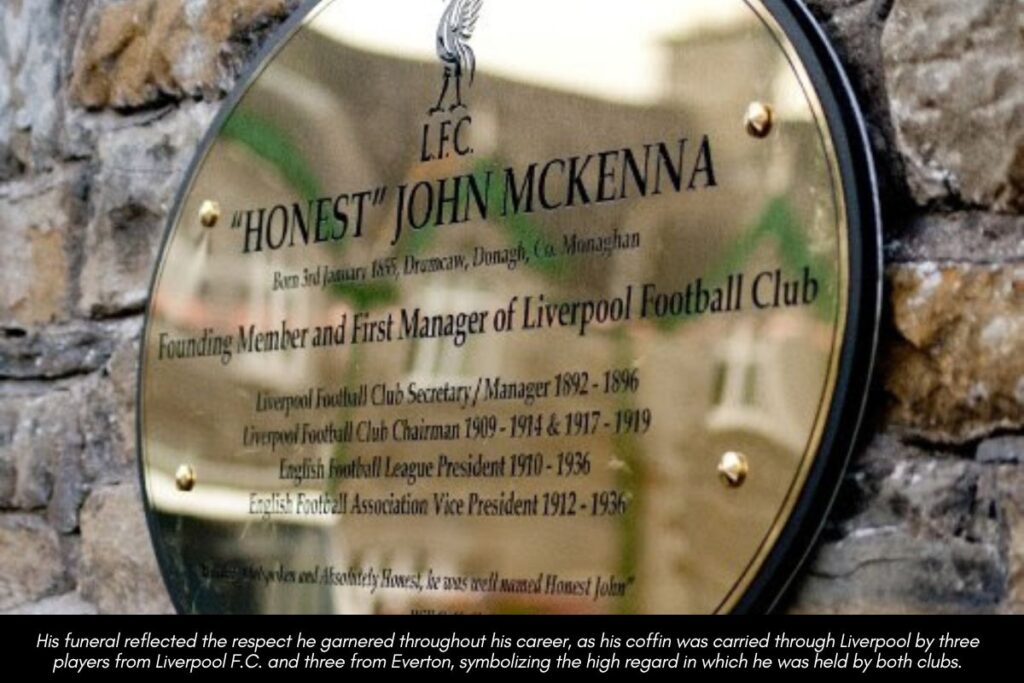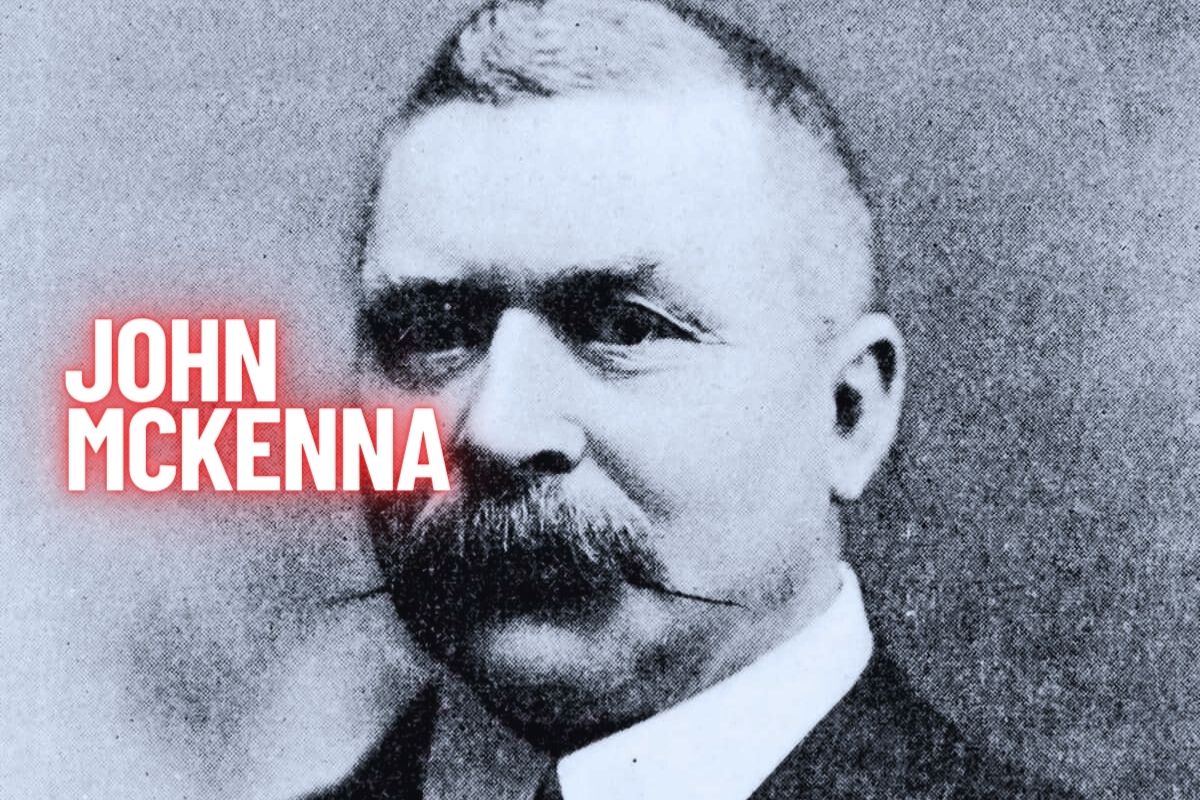John McKenna, often regarded as one of the foundational figures in Liverpool Football Club’s storied history, served as the club’s manager from its inception in 1892 until 1896. A key architect behind the club’s early successes, McKenna’s leadership helped establish Liverpool as a formidable force in English football. His tenure set the stage for the club’s future triumphs, laying a foundation that would support numerous legendary managers in the years to come. In the following sections, we will delve into John McKenna’s significant contributions, his managerial style, and the legacy he left behind, paving the way for successors who would continue to shape Liverpool’s illustrious journey.
Let’s Talk About His Early Life and Career
John McKenna was born on January 3, 1855, in Glaslough, a quaint village nestled in the northeast corner of County Monaghan, Ireland. He was the son of Patrick McKenna and Jane McCrudden. In the 1870s, seeking better opportunities, McKenna relocated to Liverpool. Upon arrival, he quickly secured employment at a local grocery store, demonstrating his work ethic and adaptability. His career took a significant turn when he became a vaccination officer for the West Derby Union, a role that showcased his dedication to public service.
John McKenna’s interests extended beyond his professional duties; he had a fervent passion for sports. While his enthusiasm for football was evident, he was particularly drawn to rugby. His commitment to the sport led him to play a crucial role in forming a regimental rugby club, through which he contributed to the local sports community. Additionally, McKenna’s involvement with the West Lancashire County Rugby Football Union underscored his deep engagement with rugby at both a recreational and organizational level.
These early experiences in Liverpool not only ingrained McKenna in the local community but also laid the groundwork for his future endeavors in football management. His multifaceted background in sports and public service would later prove invaluable as he took on the monumental task of helping to establish and manage Liverpool Football Club.
Life in Liverpool FC
John McKenna’s involvement with Liverpool F.C. began through his association with John Houlding, the founder of the club. Houlding invited McKenna to Anfield to watch his Everton team play before Everton’s departure to Goodison Park. After Everton’s exit, Houlding and McKenna remained at Anfield, determined to establish a new team. Leveraging Houlding’s connections in Glasgow, McKenna helped assemble a team predominantly composed of Scottish players, known colloquially as the “Team of Macs” due to the prevalence of players with “Mc” in their surnames, such as Duncan McLean, James McBride, Malcolm McVean, Hugh McQueen, Matt McQueen, John McCartney, Bill McOwen, and Joe McQue.

As the club’s secretary, McKenna was instrumental in Liverpool’s early organizational efforts. Despite initial rejection by the Football Association when he telegraphed for admission to the Football League, McKenna guided Liverpool through the Lancashire League. The team made an impressive debut, winning their first match 8-0 against Higher Walton, with John Smith scoring the club’s first competitive goal. Under McKenna’s stewardship, Liverpool won the Lancashire League in their first season, which paved the way for their acceptance into the Football League. They won their first Football League match against Middlesbrough Ironopolis with a 2-0 victory on September 2, 1893.
McKenna’s tenure saw Liverpool rise rapidly through the ranks, establishing themselves as a formidable team. He served as the club’s chairman from 1906 to 1915, during which time Liverpool won their first two League Championships in 1901 and 1906. However, McKenna’s influence extended beyond club management. In 1917, he was elected president of the Football League, a position he held with distinction for nearly two decades until his death in March 1936. His leadership and vision were pivotal in the development of both Liverpool F.C. and the broader football landscape.
Despite his many successes, McKenna faced challenges and setbacks. The initial rejection by the Football Association was a significant hurdle, but he overcame it with resilience and determination. His deep involvement with freemasonry, attending Cecil Lodge No. 3274 like Houlding, also highlights the broader social networks that supported his football endeavors.
John McKenna’s Death and Lasting Legacy
John McKenna passed away in March 1936, leaving behind a significant legacy in the world of football. His funeral reflected the respect and admiration he garnered throughout his career, as his coffin was carried through Liverpool by three players from Liverpool F.C. and three from Everton F.C., symbolizing the high regard in which he was held by both clubs. In honor of his contributions, a commemorative plaque was installed in the foyer of Anfield, ensuring that his legacy would be remembered by future generations. Additionally, in August 2011, another plaque was unveiled in his hometown of Glaslough, County Monaghan, Ireland.

This event was attended by over 200 people and included an informative talk by Keith Falkiner, the author of “Emerald Anfield,” who highlighted McKenna’s achievements and his profound impact on Liverpool F.C. Falkiner aptly summarized McKenna’s significance by stating, “The course of history has proven John McKenna to be one of the most powerful and successful men at Liverpool Football Club – the third most important figure, in my opinion, after only Bill Shankly and the club’s founder John Houlding. The people of Monaghan should be proud of this history and proud of ‘Honest’ John McKenna – who is arguably the greatest Irishman who has ever been involved with the game of association football in Britain.”
Beyond his work with Liverpool F.C., John McKenna made significant contributions to the broader football community. As the President of the Football League, McKenna played a prominent role in promoting and expanding the sport. One notable event was in 1925 when he formally opened the current ‘South Stand’ at Portsmouth FC’s Fratton Park stadium. This stand, designed by the renowned architect Archibald Leitch, remains a historic landmark, with a plaque commemorating McKenna’s involvement. His influence extended beyond Liverpool, demonstrating his dedication to the growth and development of football across England.
Conclusion
John McKenna’s legacy as a foundational figure in Liverpool F.C.’s history is indelible. His leadership and vision during the club’s formative years laid a strong foundation for its future successes. Beyond Liverpool, his contributions to football were significant, including his role as President of the Football League and his involvement in notable projects like Portsmouth FC’s Fratton Park. McKenna’s dedication to the sport, his pioneering efforts, and his lasting impact on both club and league levels ensure he is remembered as a pivotal figure in the annals of football history.
Read all other posts on John McKenna
Find the Latest News on Player Ratings | Transfers | Prematch | Postmatch
Stay tuned for more updates on Liverpool FC Times and Stories. Your thoughts are always welcome in the comments section. Thank you for your continued support!
YNWA (You’ll Never Walk Alone)!
The Liverpool FC Times Team
LiverpoolFCTimes.com
